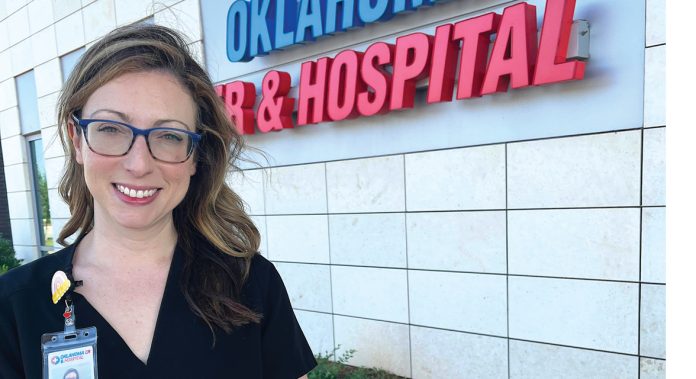
story and photo by James Coburn, Staff Writer
The fall of 2021 brings back a memory that touched the life of Lauren Funke, RN, Oklahoma ER & Hospital, located in Oklahoma City.
Emergency care was at zenith proportions during one of the biggest state-wide COVID surges.
“We were seeing quite a few critical patients where we would have to eventually intubate them and put them on a ventilator,” Funke said.
The hospital does not have an intensive care unit. So, the intubations were necessary to stabilize and transfer patients to hospitals with an ICU.
As was the case with many hospitals, Oklahoma ER & Hospital had a patient demand exceeding its capacity, so hospitals were on a constant search for available beds in other states. (story continues below)
“There was one person who almost died here. That person was intubated and sent far away out of state, and then that person ended up coming back, walked in our emergency room, looked healthy as a horse several months later and thanked everybody for saving his life,” Funke recalled.
The profession needs nurses who are empathetic, caring, and want to help after everything the nursing industry went through as a profession during the pandemic.
“It’s a very rewarding career. I would not want to do anything else with my life,” she said.
Her impetus to become a nurse occurred later in life. Funke has a previous career in music with a terminal degree in performance as a flute player from Michigan State University. She began questioning whether she was on the right path and felt a strong pull into nursing.
“I felt it would fit my personality well, compared to what I had been doing,” Funke said. “Maybe there was some burn-out. So, I finished my terminal degree the same year I started nursing school.”
Funke graduated from nursing school in 2015 from OSU/OKC. Her studies prepared her well with patient safety practices as a nurse, she said.
“It prepared me for the nursing board exam very well,” she said. “I thought my teachers were great. It was a good program especially considering it was an associate degree.”
Soon after graduating nursing school Funke went directly to a hospital ICU for two years. The opportunity taught her a lot about critical thinking skills.
Funke said it can be a challenging transition going from an ICU to ER nursing. Both are considered to be critical care. But Funke said the ER requires a nurse to think a little faster on their feet. Nurses need to be more flexible, she said, and roll with the punches a little bit more. ER nurses must be good at most nursing skills, she added.
“That was a switch for me,” she said. “But I do think you have to have very strong critical thinking skills.”
Funke began serving part-time at Oklahoma ER & Hospital in the fall of 2020 soon after the COVID pandemic began. Within a year she commenced full-time because she liked working there so much. Funke said she found Oklahoma ER & Hospital to be unique. The doctors, nurses, and clinical staff work well together with a mutual level of respect, she said.
“I think it’s unique because it’s physician owned. So, the doctors make a lot of decisions on how the place runs,” she said.
Patient flow fluctuates with an average of about 35 patients a day. Typically, an ER patient will stay in observation status for 24 hours or less, Funke said. Patients needing surgery are transferred to another hospital.
The average person generally is admitted with an elevated blood pressure due the stress of coming to an ER unexpectedly.
“People are sometimes having the worst day of their lives, not always but it’s kind of a stressful place to be when you just walk in off the street and don’t know anybody. And you’re seeking help,” she explained. “It’s not a typical doctor’s appointment.”
Funke helps to calm her patients’ fears by sitting next to them at eye level during her triage assessment. She might say, “We’re going to take care of you.” She has seen those words provide comfort.
Diagnostics are key in the ER as some patients enter emergency care without a previous diagnosis. They present a new health-related emergency.
“We’re trying to figure out what’s wrong and stabilizing the patient is the goal,” she said.
After the adrenaline rush of her ER shift, Funke settles down with her husband to spend time with their 4-year-old son and 6-year-old daughter.
“They keep me extremely busy. And then I really enjoy cooking and just being outside when it’s not 100 degrees,” she said.
For more information about the Oklahoma ER and Hospital, visit https://okerhospital.com/careers/












